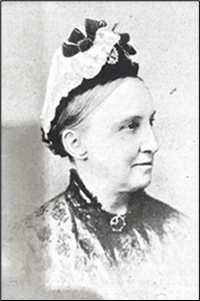
Photo of Charlotte 1893. Source: White Ribbon Association.
Charlotte was teetotal from the time of her marriage and became an ardent temperance campaigner in her own right. She was the first President of the Women’s Total Abstinence Union when it was set up in 1893 after the split from the British Women’s Temperance Association over a proposal to widen their remit to include other issues such as women’s suffrage. Charlotte supported women’s suffrage but felt that the organisation should focus exclusively on temperance.
Charlotte married Henry Wilson in 1859 and their early married life was spent living near Mansfield where he was a farmer. Henry came from a family of Nonconformist radicals and was a lifelong abstainer and Charlotte became teetotal when she married. They had no alcoholic drinks in the house for visitors or servants and encouraged their farm labourers to abstain providing only teetotal drinks at harvest-time. In 1869 they moved to the Sheffield area so Henry could join his brother in managing the Sheffield Smelting Works. Henry was for many years a Liberal MP.
Both Henry and Charlotte were involved in campaigning on a range of political and social issues, and Henry w. Her obituary stated:
She was as convinced and ardent in her political and moral views as her late husband, and whatever she believed in, she carried out with the same daunting courage and unfailing pertinacity. One example of her spirit was the stand she took with Mrs. Josephine Butler in heading the crusade against the State regulation of vice.
This ‘crusade’ was against the Contagious Diseases Act 1864 which had been introduced to regulate ‘common prostitutes’. The Act made it the law for women suspected of prostitution to register with the police and submit to an invasive medical examination. If the woman was found to be suffering from a venereal disease, she would be confined to a ‘lock hospital’ until pronounced ‘clean’. The Contagious Diseases Act was repealed in 1886.
Charlotte was also on the committee of the Sheffield House of Help for Friendless Girls and Women for 18 years. This house was in Paradise Square and provided accommodation and support for homeless young women. There were several criteria for entry including ‘young women who have fallen from virtue, and desire to redeem their character’.
Charlotte and Henry were interred in grave DD 135 in the Nonconformist area which is still visible.



